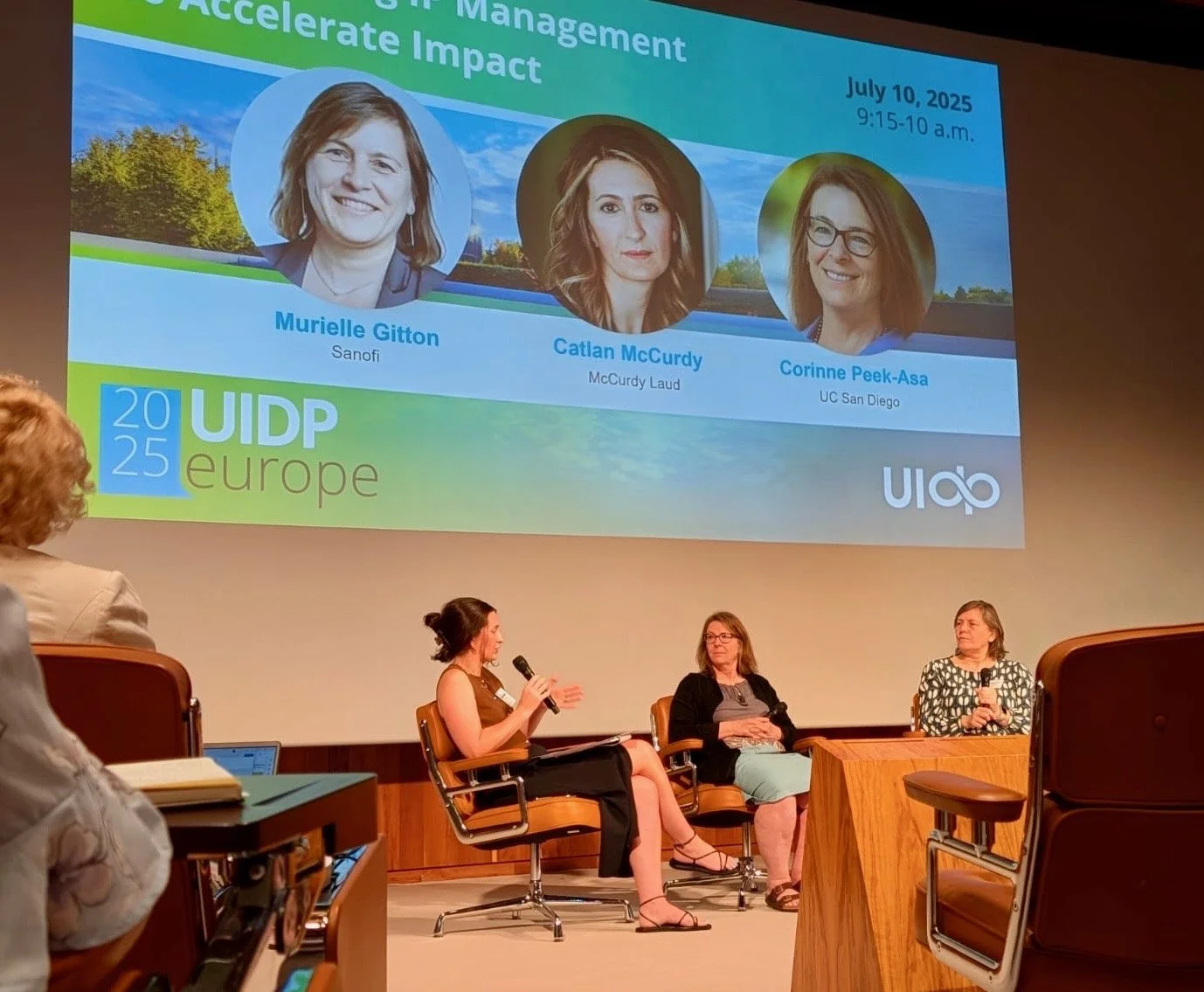Volume XIII - August 2025
Firm Updates
Happy Anniversary!
Join us in celebrating our Principal Attorney, Sanjiv Laud, who joined the McCurdy Laud firm 3 years ago!
Some highlights of his time with McCurdy Laud include:
Perfect at the Federal Circuit - Three arguments, three complete victories. Whether defending medical device patents against competitors or cementing wins for open-source software companies against patent trolls, Sanjiv delivers when it matters most.
Turning the tide - When a district court ruled all of our client's patents invalid after two years of proceedings, Sanjiv didn't just appeal—he got the Federal Circuit to expedite the case and completely reverse the decision in under six months.
Swift justice - Before discovery even began, Sanjiv successfully argued for complete dismissal with prejudice of a "billions of dollars" theft-of-idea case against a major retailer. Sometimes the best litigation strategy is ending litigation quickly.
Walk-away wins - From defending national banking institutions to securing arbitration victories for medical device companies, Sanjiv consistently delivers outcomes that let our clients focus on their business, not their legal problems.
Here's to many more years of excellence, Sanjiv!
Firm Travel: Basel, Switzerland
We’re pleased to share that Catlan McCurdy recently returned from UIDP Europe in Basel, Switzerland, where she moderated a panel on "Re-imagining IP Management to Accelerate Impact" alongside industry leaders Corinne Peek-Asa and Murielle Gitton. The discussion explored how data sharing partnerships are becoming strategic tools rather than simple transactions, and how innovation funding models continue to evolve while relationships remain the constant currency.
What energized Catlan most wasn't just the formal presentations, but the sidebar conversations where pharmaceutical executives, tech startup founders, and university administrators discovered their shared challenge: bridging the gap between academic innovation and real-world commercialization.
As she noted in her post-conference reflections, the best legal counsel emerges not from cookie-cutter templates, but from understanding how each client's unique research ecosystem operates—whether they're negotiating sponsored research agreements, navigating collaborative IP ownership, or structuring technology transfer deals that actually work in practice.
Firm Travel: Bozeman, Montana
In April, Catlan McCurdy and Melissa Nelson made their way back to beautiful Bozeman, Montana for a blend of client care, strategic planning, and Montana hospitality.
The trip was anchored by comprehensive training sessions with our valued client, Bridger Photonics. These in-person connections are part of the foundation of how we approach legal services—understanding our clients' businesses from the inside out.
Firm Spotlight
McCurdy Laud is honored to be recognized as one of "Best Up & Coming Law Firms" by MN Lawyer!
This recognition celebrates Minnesota-based firms established within the past five years that have demonstrated meaningful success in our local legal community. Firms are evaluated not just on growth and revenue, but also on their commitment to employee support, workplace morale, and consistent community engagement—all pillars we've strived to build our practice on from day one.
This recognition highlights what we've always believed: being a firm of traditionally trained lawyers with untraditional perspectives allows us to draw on our varied backgrounds of creative, legal, and business experience to provide the nimble, personalized service our clients deserve in intellectual property transactions and disputes.
Thank you to our amazing clients who trust us with their intellectual property and technology needs, and to our dedicated team who embody our mission every day. We're just getting started!
Current Cases
Circuit Split Update: Supreme Court Denies Review, Leaving Patent Licensing Guidance in Place
On June 2, 2025, the Supreme Court denied Atrium Medical Corporation's petition for writ of certiorari in its dispute with C.R. Bard, Inc., definitively ending what Atrium had hoped would be the vehicle to resolve what it characterized as a circuit split over post-patent-expiration royalty obligations. We discussed this case along with Ares Trading S.A. v. Dyax Corp. in our December 2024 newsletter and emphasized how these cases can offer guidance, rather than sow confusion. The denial suggests the justices agree—despite the Third and Ninth Circuits emphasizing different analytical touchstones, both courts ultimately reached results consistent with existing Brulotte doctrine.
The Domino Effect
The denial carries immediate practical consequences. The Corteva Agriscience LLC v. Monsanto Co. case, pending before the Delaware Supreme Court, had been stayed pending Atrium's petition. Now that agricultural licensing dispute will resume. The central dispute concerns whether Corteva was obligated to continue paying royalties to Monsanto after the expiration of certain patents under their licensing agreement for genetically modified corn technologies. Originally established in 1992, this agreement granted Corteva rights to use Monsanto's patented technology in exchange for royalty payments. Although Monsanto's last applicable U.S. patent expired in 2022, its last applicable patent (in Brazil) expires in 2028.
The Delaware Superior Court determined that the agreement's singular royalty rate (as opposed to specific country rates) meant that the parties intended for a single royalty rate which would terminate upon expiration of the last patent rights, thus rejecting Corteva's claim that royalties should be treated on a per-country basis. The court relied on Kimble v. Marvel Entertainment, which described ways parties may tailor license arrangements to avoid patent misuse. The agreement at issue here was a latest-running patent agreement, which is expressly permitted under Kimble. Additionally, the agreement licensed patent and non-patent rights (such as know-how), and the royalty rate did not distinguish between these rights.
This demonstrates the global complexity of modern patent licensing, where unified royalty structures deliberately span multiple jurisdictions precisely as Kimble envisioned when it noted that parties could "find ways around" Brulotte, and underscores our guidance from December's newsletter to clearly and precisely define the patent scope, use, and expiration to anticipate potential future ambiguity.
Looking Forward
The Supreme Court's denial sends a clear message: current circuit-level guidance is sufficient for navigating post-patent-expiration royalty obligations. For clients structuring patent licenses, this creates both opportunity and obligation. The opportunity lies in understanding that courts are increasingly comfortable with creative payment structures that respect Brulotte's core prohibition while meeting business objectives. The obligation is to draft with sufficient precision to avoid ambiguity.
As the Delaware Supreme Court prepares to resume consideration of the Corteva case, patent practitioners will be watching closely. The decision could provide valuable guidance on "latest-running patent" clauses in multi-jurisdictional agreements, especially valuable as companies increasingly operate across patent systems with different terms and expiration dates."
In Memory of Paralegal Perry
Dear Readers,
It is with the heaviest of hearts that we say goodbye to our handsome and wise Paralegal Perry. Perry was a constant presence in our offices and our hearts since 2012. As part of a founding member of the McCurdy Laud team and an important part of this newsletter, we miss him every day and we know you will too.
Thank you, Perry, for being a friend, a confidant, a protector, and a damn good paralegal. Try not to eat too many acorns on the other side.
With love and the fondest of memories,
The McCurdy Laud Team
Upcoming Events
Events
Upcoming UIDP Webinar: Catlan is moderating a conversation with Elaine Brock, Senior UIDP Fellow, on July 30th about the real challenges our clients face: navigating compliance complexities in university-industry research contracts.
Join us for actionable insights that make complex compliance issues clear and manageable! Register in advance through UIDP here.
09/01 | McCurdy Laud Closed for Labor Day
09/15 | First Day of Hispanic Heritage Month
Note from Catlan
I'm deeply saddened by the loss of Perry, who many of you knew through his "Dear Paralegal Perry" columns or appearances in the background of my video calls. Perry embodied so many of our firm values—he was dedicated, curious, and enthusiastic about everything he approached. As a true working dog, he understood that the best work comes from genuine engagement and persistent effort.
Speaking of practicalities, I've been thinking lately about the power of clear communication in complex negotiations. This reflection has been particularly relevant as I've been working on a piece about term sheets for university-industry collaborations.
My recently published article for UIDP explores how term sheets can transform the front end of complex negotiations. Too often, I've watched promising collaborations get bogged down in dense legal language before the parties even confirm they're aligned on basic business principles. The simple act of creating a concise, plain-English term sheet—capturing project scope, IP ownership, commercialization rights, financial terms, and publication protocols—can save months of misunderstanding later.
But here's what I find most compelling, and it’s something I learned from one of my own clients: the "bookend" approach I describe in the article. After executing a complex agreement, creating a final term sheet that captures what was actually negotiated provides invaluable clarity for project managers, new stakeholders, and anyone who needs to understand the deal without wading through thirty pages of legal provisions. It's documentation that actually serves the people doing the work.
This focus on practical, accessible communication extends beyond term sheets to everything we do at McCurdy Laud. Whether Sanjiv is achieving another Federal Circuit victory (congratulations on three years of excellence!), or Melissa and I are conducting client training sessions, our goal is always the same: make complex legal concepts clear and actionable for the people who need to use them.
As we move through the second half of 2025, I'm energized by our continued growth—being recognized as one of Minnesota Lawyer's "Best Up & Coming Law Firms" was particularly meaningful—but more importantly, by the deepening relationships we're building with clients who trust us to understand their businesses from the inside out.
As I move forward, I'll continue approaching every client challenge with the same dedication, curiosity, and enthusiasm that Perry brought to his work—qualities that remain central to who we are as a firm.
Until next time, keep innovating—and if you're working on university-industry collaborations, consider starting your next negotiation with a simple question: "Before we draft an agreement, can we align on the core principles?







